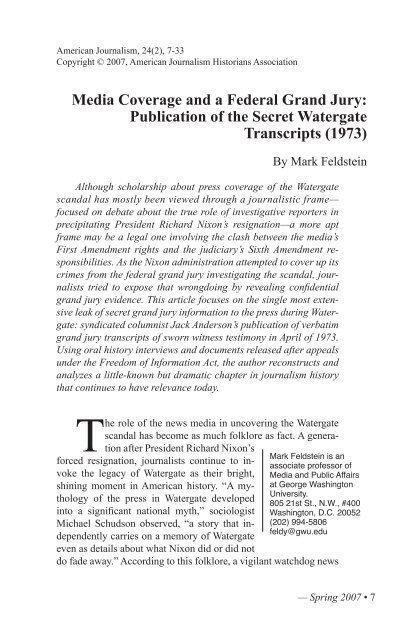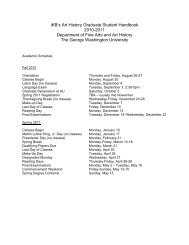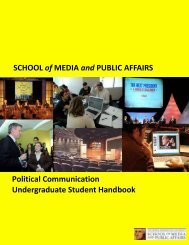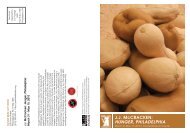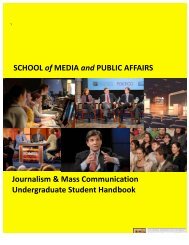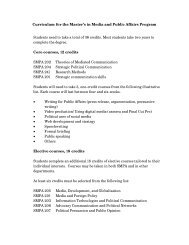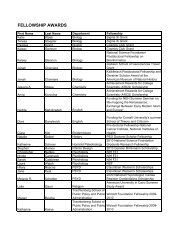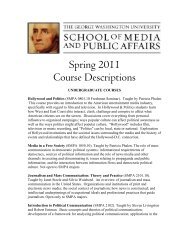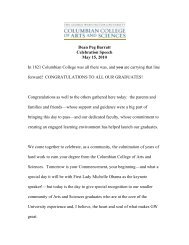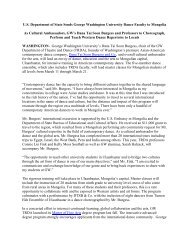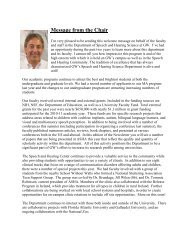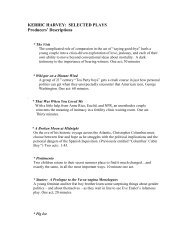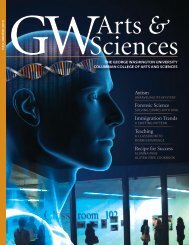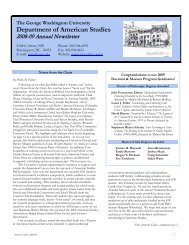Media Coverage and a Federal Grand Jury
Media Coverage and a Federal Grand Jury
Media Coverage and a Federal Grand Jury
Create successful ePaper yourself
Turn your PDF publications into a flip-book with our unique Google optimized e-Paper software.
American Journalism, 24(2), 7-33<br />
Copyright © 2007, American Journalism Historians Association<br />
<strong>Media</strong> <strong>Coverage</strong> <strong>and</strong> a <strong>Federal</strong> Gr<strong>and</strong> <strong>Jury</strong>:<br />
Publication of the Secret Watergate<br />
Transcripts (1973)<br />
Although scholarship about press coverage of the Watergate<br />
sc<strong>and</strong>al has mostly been viewed through a journalistic frame—<br />
focused on debate about the true role of investigative reporters in<br />
precipitating President Richard Nixon’s resignation—a more apt<br />
frame may be a legal one involving the clash between the media’s<br />
First Amendment rights <strong>and</strong> the judiciary’s Sixth Amendment responsibilities.<br />
As the Nixon administration attempted to cover up its<br />
crimes from the federal gr<strong>and</strong> jury investigating the sc<strong>and</strong>al, journalists<br />
tried to expose that wrongdoing by revealing confidential<br />
gr<strong>and</strong> jury evidence. This article focuses on the single most extensive<br />
leak of secret gr<strong>and</strong> jury information to the press during Watergate:<br />
syndicated columnist Jack Anderson’s publication of verbatim<br />
gr<strong>and</strong> jury transcripts of sworn witness testimony in April of 1973.<br />
Using oral history interviews <strong>and</strong> documents released after appeals<br />
under the Freedom of Information Act, the author reconstructs <strong>and</strong><br />
analyzes a little-known but dramatic chapter in journalism history<br />
that continues to have relevance today.<br />
The role of the news media in uncovering the Watergate<br />
sc<strong>and</strong>al has become as much folklore as fact. A genera-<br />
tion after President Richard Nixon’s<br />
forced resignation, journalists continue to invoke<br />
the legacy of Watergate as their bright,<br />
shining moment in American history. “A mythology<br />
of the press in Watergate developed<br />
into a significant national myth,” sociologist<br />
Michael Schudson observed, “a story that independently<br />
carries on a memory of Watergate<br />
even as details about what Nixon did or did not<br />
By Mark Feldstein<br />
Mark Feldstein is an<br />
associate professor of<br />
<strong>Media</strong> <strong>and</strong> Public Affairs<br />
at George Washington<br />
University.<br />
805 21st St., N.W., #400<br />
Washington, D.C. 20052<br />
(202) 994-5806<br />
feldy@gwu.edu<br />
do fade away.” According to this folklore, a vigilant watchdog news<br />
— Spring 2007 • 7
media helped expose a corrupt president <strong>and</strong> force him from office.<br />
“The press, truth its only weapon, saves the day,” Schudson wrote.<br />
“And the good guys win.” 1<br />
This media mythology continues to be embraced by journalistic<br />
practitioners even as it is contested by scholars who argue that<br />
Watergate reporters were merely conduits for orchestrated leaks <strong>and</strong><br />
followed rather than led law enforcement officials who uncovered<br />
the sc<strong>and</strong>al. 2 Whatever its resemblance to historical truth, this Watergate<br />
folklore represents the dominant frame through which media<br />
coverage of the sc<strong>and</strong>al has been debated. Nonetheless, a more apt<br />
frame might view Watergate reporting not through the lens of journalistic<br />
heroics (or lack thereof) but through the prism of news media<br />
coverage of secret gr<strong>and</strong> jury proceedings. After all, it was a gr<strong>and</strong><br />
jury investigation of the break-in at the Democratic National Committee<br />
headquarters in June of 1972 that first triggered media coverage<br />
of the sc<strong>and</strong>al that would become known as Watergate; <strong>and</strong> most<br />
of the subsequent reporting on the story occurred as a result of leaks<br />
that were unearthed in the course of the gr<strong>and</strong> jury’s probe of the<br />
original <strong>and</strong> subsequent crimes. Moreover, such a frame helps place<br />
Watergate reporting in historical context, allowing it to be viewed<br />
not solely as sui generis but as a case study involving broader issues<br />
of gr<strong>and</strong> jury media coverage.<br />
This article examines the little-studied 3 leaking of secret Watergate<br />
gr<strong>and</strong> jury transcripts in April 1973 to syndicated columnist<br />
Jack Anderson, then the nation’s most famous crusading investigative<br />
reporter. Although other journalists would eventually receive<br />
more acclaim for their Watergate reporting—especially Bob Woodward<br />
<strong>and</strong> Carl Bernstein of the Washington Post—Anderson’s receipt<br />
<strong>and</strong> publication of verbatim transcripts of the sworn testimony<br />
of witnesses before the Watergate gr<strong>and</strong> jury was the most extensive,<br />
detailed <strong>and</strong> incontrovertible single penetration of the secret<br />
federal probe by the news media. The case led prosecutors to threaten<br />
criminal sanctions against Anderson <strong>and</strong> to a dramatic showdown<br />
between the journalist <strong>and</strong> the judiciary.<br />
This account is based on oral history interviews, court records,<br />
<strong>and</strong> archival collections, including previously redacted documents<br />
from the National Archives that were released after the author successfully<br />
appealed under the Freedom of Information Act. By explaining<br />
the historical <strong>and</strong> legal background of gr<strong>and</strong> jury secrecy,<br />
this case illustrates not only the gr<strong>and</strong> jury frame of Watergate reporting<br />
but also the larger issues that can arise in such coverage<br />
when the First Amendment clashes with the Sixth.<br />
8 • American Journalism —
Historical <strong>and</strong> Legal Background<br />
At first blush, the First <strong>and</strong> Sixth Amendments to the Constitution<br />
might not seem to have obvious or inherent conflicts with one<br />
another. The First Amendment protects freedom of expression: of<br />
religion, speech, press, assembly <strong>and</strong> petition. The Sixth Amendment<br />
protects the right to a fair trial, guaranteeing that it be “speedy<br />
<strong>and</strong> public,” allowing the accused to have an attorney <strong>and</strong> to present<br />
<strong>and</strong> confront witness before an “impartial jury.” 4 Both amendments<br />
are part of the Bill of Rights <strong>and</strong> were designed to safeguard the<br />
liberty of the individual against the power of the state. In many respects,<br />
these rights reinforce each other: watchdog media can help<br />
protect courtroom justice just as judicial fairness can help safeguard<br />
a free press.<br />
In practice, however, First <strong>and</strong> Sixth Amendment rights have<br />
often clashed, especially when journalistic notions of free expression<br />
have resisted judicial secrecy imposed to guarantee a fair trial.<br />
Numerous legal cases have tried to weigh the right of a free press<br />
to report on legal matters against the need of the courts to ensure<br />
justice. Such balancing tests have involved media access to court<br />
proceedings; 5 journalistic protections for sources <strong>and</strong> notes; 6 <strong>and</strong><br />
prejudicial pretrial publicity. 7<br />
The gr<strong>and</strong> jury system has been a particular arena of conflict<br />
between journalists <strong>and</strong> judges. The modern gr<strong>and</strong> jury is a special<br />
panel of citizens established to determine whether there is sufficient<br />
evidence to bring a suspect to trial. <strong>Federal</strong> gr<strong>and</strong> juries are composed<br />
of sixteen to twenty-three people drawn at r<strong>and</strong>om from voter<br />
registration rolls. 8 These gr<strong>and</strong> juries have terms lasting eighteen<br />
months <strong>and</strong> issue indictments in many different kinds of cases that<br />
come before them. This gr<strong>and</strong> jury is wholly different from a trial<br />
(or petit) jury, whose purpose is to determine the guilt or innocence<br />
of an accused person during a trial. While trial juries must determine<br />
a suspect’s guilt “beyond a reasonable doubt,” gr<strong>and</strong> juries<br />
need only find “probable cause” of guilt in order to issue an indictment<br />
that will lead to a trial. As a result, gr<strong>and</strong> juries have considerable<br />
latitude in the evidence that they collect. For example, unlike<br />
trial juries, gr<strong>and</strong> juries can consider hearsay evidence <strong>and</strong> as a rule<br />
are not exposed to defense testimony explaining the side of the accused.<br />
9<br />
At the heart of the gr<strong>and</strong> jury system—<strong>and</strong> at the center of its<br />
conflict with journalistic expression—is secrecy. Only prosecutors<br />
<strong>and</strong> stenographers are allowed to be present when federal gr<strong>and</strong> ju-<br />
— Spring 2007 • 9
ors question a witness. Attorneys for witnesses must wait outside<br />
the gr<strong>and</strong> jury room. Even prosecutors <strong>and</strong> transcribers are barred<br />
from being present while the gr<strong>and</strong> jury deliberates or votes. And<br />
although witnesses may discuss their testimony afterwards, federal<br />
rules strictly forbid gr<strong>and</strong> jurors, prosecutors or stenographers from<br />
doing so. 10 Gr<strong>and</strong> jury secrecy is designed to protect the rights of innocent<br />
people who may unfairly come under suspicion by prosecutors<br />
but ultimately are not charged. Secrecy can also help encourage<br />
witnesses to testify without fear of publicity <strong>and</strong> can prevent criminal<br />
targets from fleeing or destroying evidence, or intimidating or<br />
silencing witnesses. 11<br />
The gr<strong>and</strong> jury system has deep roots in both American <strong>and</strong><br />
British law. 12 Gr<strong>and</strong> juries were originally dubbed the “People’s<br />
Panel” because they are composed of ordinary citizens <strong>and</strong> were<br />
intended to be a check on overzealous prosecutors. According to the<br />
Supreme Court, the gr<strong>and</strong> jury has historically “been regarded as a<br />
primary security for the innocent against hasty, malicious, <strong>and</strong> oppressive<br />
prosecution; it serves the invaluable function in our society<br />
of st<strong>and</strong>ing between accuser <strong>and</strong> accused.” 13 However, gr<strong>and</strong> juries<br />
have frequently been misused for political purposes. During the<br />
1930s, New York prosecutor Thomas E. Dewey greatly exp<strong>and</strong>ed<br />
the use of gr<strong>and</strong> juries to force testimony <strong>and</strong> thereby make it easier<br />
to imprison corrupt politicians. In the 1950s, government officials<br />
used gr<strong>and</strong> juries to interrogate suspected Communists <strong>and</strong> then jail<br />
them for contempt of court when they refused to answer questions.<br />
By thus abusing the gr<strong>and</strong> jury system, prosecutors were able to find<br />
a way to imprison dissidents even though authorities lacked sufficient<br />
evidence to convict them of any underlying crimes. By the<br />
1960s, gr<strong>and</strong> juries followed the recommendations of prosecutors in<br />
more than 97 per cent of all cases. The trend toward turning gr<strong>and</strong><br />
juries into proverbial “rubber stamps” of prosecutors—panels that<br />
would, to borrow another cliché, readily indict a ham s<strong>and</strong>wich 14 —<br />
only accelerated over time. F. Lee Bailey voiced the view of many<br />
defense lawyers of that era when he called the contemporary gr<strong>and</strong><br />
jury “a flock of sheep led by the prosecutor across the meadows to<br />
the finding he wants.” 15<br />
In 1969, after being elected president on a law-<strong>and</strong>-order platform,<br />
Richard Nixon exp<strong>and</strong>ed the powers of federal gr<strong>and</strong> juries<br />
<strong>and</strong> used them to crack down on street crime <strong>and</strong> leftist political<br />
dissent. Under the direction of Attorney General John Mitchell, a<br />
Nixon friend who managed the President’s political campaigns, the<br />
Justice Department began using gr<strong>and</strong> juries to gather domestic po-<br />
10 • American Journalism —
litical intelligence. The Republican administration forced left-leaning<br />
activists to answer questions under oath about who their associates<br />
were, much as the government did during the Redbaiting 1950s;<br />
this raw intelligence was then computerized <strong>and</strong> used to generate<br />
lists of other dissidents to question before future gr<strong>and</strong> juries. 16 In<br />
addition, Nixon administration prosecutors began using the gr<strong>and</strong><br />
jury system in obvious “fishing expeditions” to try to force journalists<br />
to reveal confidential sources. 17<br />
In contrast to its original historical design, one scholar noted,<br />
the gr<strong>and</strong> jury system “became an important weapon in the h<strong>and</strong>s<br />
of the prosecutors whose powers it had been created to check.” 18 Or<br />
as another expert put it, “an institution designed to protect us from<br />
the dangers of a police state has been used to bring us still closer to<br />
one.” 19<br />
But ironically, in his second term as president, Richard Nixon<br />
began seeking ways to curb the power of the gr<strong>and</strong> jury that he had<br />
helped to exp<strong>and</strong>. The reason was not a philosophical change of<br />
heart but self-preservation: Nixon himself was personally the target<br />
of the Watergate gr<strong>and</strong> jury.<br />
The Watergate Gr<strong>and</strong> <strong>Jury</strong><br />
In June 1972, Washington, D.C., police caught five men with illegal<br />
bugging devices at the Democratic National Committee headquarters<br />
in the Watergate office complex. The arrest of the Watergate<br />
burglars—who turned out to be part of a wide-ranging political espionage<br />
<strong>and</strong> sabotage operation run by the Nixon campaign—eventually<br />
unraveled a much larger White House cover-up directed by the<br />
President himself, one that would lead to his resignation in disgrace<br />
twenty-six months later. Nonetheless, the President’s press secretary<br />
dismissed the break-in as a “third-rate burglary” <strong>and</strong> the case was<br />
initially h<strong>and</strong>led in a manner similar to other routine crimes—with<br />
a gr<strong>and</strong> jury investigation led by federal prosecutors from the local<br />
U.S. attorney’s office. 20<br />
At first, media coverage of the Watergate break-in was typical<br />
of any other local crime story, covered off the police blotter by<br />
metro beat reporters who interviewed detectives <strong>and</strong> attended the<br />
suspects’ arraignment. As the hometown newspaper with the greatest<br />
local bench strength, the Washington Post scored the earliest<br />
scoops about the case, thanks to verbal leaks by police, witnesses,<br />
<strong>and</strong> attorneys involved in the gr<strong>and</strong> jury investigation. 21 The Post’s<br />
reporting suggested the story was of national import <strong>and</strong> other me-<br />
— Spring 2007 • 11
dia outlets hurried to catch up. “If I happened to be st<strong>and</strong>ing next<br />
to the urinal with somebody who knew something about the gr<strong>and</strong><br />
jury,” said reporter Seymour Hersh, “it was in The New York Times”<br />
the next day. Although editors at the Times were normally cautious<br />
about publishing information about ongoing gr<strong>and</strong> jury investigations,<br />
Hersh said, during the competitive Watergate sc<strong>and</strong>al “they<br />
published them because the market was so hot.” 22<br />
Although various news reports suggested that officials connected<br />
to President Nixon directed the Watergate burglars, the federal<br />
gr<strong>and</strong> jury investigating the break-in failed to uncover such evidence.<br />
The Watergate defendants received “hush money” payoffs to<br />
keep quiet <strong>and</strong> none of the burglars initially implicated higher-ups.<br />
“There is no evidence of a wider conspiracy,” the lead prosecutor<br />
declared. 23<br />
The prosecutors’ lack of success raised suspicions because they<br />
themselves were part of the Nixon Justice Department. In fact, their<br />
boss had been Attorney General John Mitchell, the very man who<br />
would turn out to have authorized the illegal Watergate burglary<br />
in the first place. Democratic National Committee lawyer Joseph<br />
Califano complained that prosecutors “repeatedly tossed cream-puff<br />
questions” at important gr<strong>and</strong> jury witnesses “to avoid the potential<br />
implication of anyone higher up,” <strong>and</strong> “generously permitted high<br />
Nixon officials to submit written statements to the gr<strong>and</strong> jury rather<br />
than subject them to the possibility of embarrassing questions.” 24<br />
According to Senator Sam Ervin, “the prosecutors fell substantially<br />
short of prying open <strong>and</strong> presenting to the gr<strong>and</strong> jury the truth.” 25<br />
Partisan Democrats weren’t the only ones who felt that way. Newspaper<br />
editorials <strong>and</strong> the presiding federal judge, a Republican, also<br />
criticized the gr<strong>and</strong> jury investigation. 26 One Watergate prosecutor<br />
later admitted that his colleagues “had cut off gr<strong>and</strong> jurors’ questions”<br />
as a way to limit the investigation. 27 As the Watergate investigation<br />
stalled in the fall of 1972, Nixon was re-elected to office in<br />
a l<strong>and</strong>slide.<br />
Five months later, on April 16, 1973, syndicated columnist Jack<br />
Anderson began a series of seven articles that quoted extensively<br />
from verbatim transcripts of secret testimony before the Watergate<br />
gr<strong>and</strong> jury, complete with the stammering <strong>and</strong> ungrammatical responses<br />
of various Watergate figures as well as the exact questions<br />
asked by prosecutors <strong>and</strong> gr<strong>and</strong> jurors. 28 While Anderson did not<br />
explicitly state that he had obtained the gr<strong>and</strong> jury transcripts, his<br />
extensive <strong>and</strong> detailed quotations left little doubt. According to a<br />
confidential FBI memo, the court reporters who transcribed the<br />
12 • American Journalism —
gr<strong>and</strong> jury testimony “compared the office copy of th[e] transcript<br />
for that day with the column appearing in the paper <strong>and</strong> determined<br />
they were identical, even down to the punctuation.” 29 As the Washington<br />
Post put it, “Jack Anderson obviously is in possession of authentic<br />
copies of the minutes of testimony before the federal court<br />
gr<strong>and</strong> jury.” 30<br />
Anderson claimed that his “revelations” from the transcripts<br />
were “startling.” 31 In fact, however, the substance of his columns<br />
was relatively minor in importance since most of the key facts had<br />
already been reported elsewhere as a result of verbal leaks to other<br />
journalists. 32 But the fact that Anderson had obtained the closely<br />
guarded transcripts themselves was startling, since the documents<br />
were so sensitive that prosecutors had locked them in their office.<br />
According to the Washington Post, a source in the U.S. attorney’s<br />
office “said that ‘very, very few’ persons have access to gr<strong>and</strong> jury<br />
transcripts…. Normally, only prosecutors, transcribers <strong>and</strong> typists<br />
would have access to the transcripts of gr<strong>and</strong> jury minutes.” 33 The<br />
government was forced to acknowledge publicly that Anderson’s<br />
transcripts were indeed authentic <strong>and</strong> the FBI swept the gr<strong>and</strong> jury<br />
room in an unsuccessful effort to find any hidden bugs that may<br />
have been planted inside the Washington courthouse. “All hell<br />
broke loose,” the columnist remembered happily. “Someone had<br />
broken the law, <strong>and</strong> the Justice Department <strong>and</strong> the judges damn<br />
well wanted to know who.” 34<br />
On April 23, 1973, all fifteen federal judges in Washington held<br />
an unprecedented executive session to decide what to do about the<br />
Anderson leaks. Afterwards, chief Judge John Sirica issued an order<br />
from the full court directing the U.S. attorney to conduct a separate<br />
gr<strong>and</strong> jury investigation “of the unauthorized disclosure of Gr<strong>and</strong><br />
<strong>Jury</strong> verbatim transcripts in the Watergate matter.” 35 Sirica noted<br />
pointedly that the leaks to Anderson were illegal under Rule 6(e) of<br />
the <strong>Federal</strong> Rules of Criminal Procedure. Gr<strong>and</strong> jury secrecy “preserves<br />
the integrity of the Gr<strong>and</strong> <strong>Jury</strong> by protecting the innocent <strong>and</strong><br />
encouraging free disclosure by persons who have information with<br />
respect to possible commission of crimes,” Sirica emphasized. 36 According<br />
to Brit Hume, a reporter who worked for Anderson, the controversial<br />
columnist “got himself into a jam far more ominous than<br />
any he had ever been in before.” 37<br />
Under the law, it was a crime for any “agents” of the government—prosecutors,<br />
gr<strong>and</strong> jurors, or stenographers—to leak the<br />
transcripts. Although it was not a crime for Anderson to publish<br />
them, he faced the possibility of being held in contempt of court<br />
— Spring 2007 • 13
if he refused to reveal his source of the transcripts. Ever defiant,<br />
Anderson declared that “I cannot divulge my sources” <strong>and</strong> would<br />
not do so even if subpoenaed before the gr<strong>and</strong> jury: “Under our<br />
Constitution we are free to publish any <strong>and</strong> all news generated by<br />
the White House, the Congress, or the courts. No federal rule of<br />
criminal procedure supersedes the Constitution, which grants freedom<br />
of the press.” Anderson argued that other journalists had also<br />
published information about testimony before the gr<strong>and</strong> jury, based<br />
on anonymous sources: “The government is upset, apparently, because<br />
we nailed down the testimony precisely rather than relying<br />
on hearsay.” 38 Anderson reporter Hume expressed exasperation that<br />
“Jack was not only saying publicly that he was being singled out for<br />
his accuracy” but also was preaching “a little civics lecture. I winced<br />
at the thought of how Jack’s statement must have been received by<br />
those fifteen judges who had voted to have him investigated.” 39<br />
Anderson’s defense was not humble but it was accurate on at<br />
least one essential point: he was not the only journalist who disclosed<br />
secret testimony before the Watergate gr<strong>and</strong> jury. In fact,<br />
numerous other news outlets also received leaks about the gr<strong>and</strong><br />
jury probe, passed on by various Watergate actors using the media<br />
in differing ways to jockey for position. 40 At the Washington Post,<br />
reporters Bob Woodward <strong>and</strong> Carl Bernstein unsuccessfully tried<br />
to persuade Watergate gr<strong>and</strong> jurors themselves to leak details about<br />
their secret probe. In response, Judge Sirica publicly upbraided the<br />
two reporters for their “extremely serious” tactics, which he suggested<br />
may have constituted contempt of court. 41 Sirica went even<br />
further <strong>and</strong> issued a gag order after the Los Angeles Times obtained<br />
an interview with a key gr<strong>and</strong> jury witness; but the Supreme Court<br />
overruled Sirica <strong>and</strong> the interview was ultimately published. 42<br />
However, these leaks to other journalists were verbal not written;<br />
none consisted of secret government documents such as the<br />
nearly 500 pages of gr<strong>and</strong> jury transcripts provided to Anderson.<br />
Indeed, Anderson received not merely a leak but a veritable flood,<br />
one that continued day after day on the pages of hundreds of newspapers<br />
across the nation, making a public mockery of the gr<strong>and</strong><br />
jury’s purportedly confidential deliberations. The glaring nature of<br />
Anderson’s breach in judicial secrecy was indisputable. Moreover,<br />
Anderson’s public challenge that he was merely one of many journalists<br />
disclosing gr<strong>and</strong> jury testimony only underscored <strong>and</strong> further<br />
challenged the judiciary’s inability to preserve its own secrecy.<br />
According to secretly recorded White House tapes, President<br />
Nixon was deeply disturbed by the leak of the transcripts. “Of course<br />
14 • American Journalism —
Jack Anderson has them—ugh—verbatim,” Nixon complained to<br />
his aides. “Let me tell you, in view of this Jack Anderson thing, that<br />
may damage this gr<strong>and</strong> jury. [T]he way the leaks are coming out, I<br />
mean, it gives the impression that we really aren’t getting at it [investigating<br />
the sc<strong>and</strong>al].” 43<br />
Theories varied about who leaked the transcripts <strong>and</strong> why. The<br />
assistant U.S. attorneys in the case believed that Anderson obtained<br />
the transcripts from an employee of the company that transcribed<br />
gr<strong>and</strong> jury proceedings for the Justice Department. FBI agents interrogated<br />
the company’s stenographers but they denied supplying the<br />
transcripts to Anderson. 44 Several federal judges suggested that one<br />
of the assistant U.S. attorneys working on the case was Anderson’s<br />
source since his column portrayed the prosecutors posing tough <strong>and</strong><br />
incisive questions to dissembling gr<strong>and</strong> jury witnesses. 45 Unnamed<br />
Justice Department higher-ups told the Washington Post that they,<br />
too, “suspected” one of the three assistant U.S. attorneys was the<br />
leak <strong>and</strong> had “castigated” them for it. 46<br />
But Attorney General Richard Kleindienst, who had replaced<br />
John Mitchell, told the President that Anderson’s source must have<br />
been a gr<strong>and</strong> juror or court stenographer. “Cut the crap,” Nixon<br />
snapped, according to his White House tapes. “We both know it<br />
came out of the Justice Department.” 47 The President, well aware of<br />
how he had tried to shut down the gr<strong>and</strong> jury investigation, believed<br />
that career prosecutors were leaking the transcripts in an effort to<br />
keep the probe alive. “I think there’s terrible significance to…these<br />
continuing leaks,” Nixon told his staff, because they suggested a<br />
deliberate effort by prosecutors to publicize the evidence implicating<br />
the White House. 48 The President’s cover-up depended on secrecy,<br />
<strong>and</strong> if gr<strong>and</strong> jury deliberations could not be kept secret what<br />
could be? “The least you should do is to take the three members<br />
of the prosecuting team <strong>and</strong> put them to a lie-detector test,” Nixon<br />
instructed assistant attorney general Henry Petersen. “Now, I do that<br />
with members of my staff <strong>and</strong> I’m therefore directing you do that<br />
to them.” 49<br />
Anderson never revealed who leaked the transcripts to him. He<br />
told the press that the source was “not a court reporter, not an officer<br />
of the court, not a prosecutor—he was none of those things.” The<br />
columnist added, disingenuously, that the leak came from a “man<br />
with high connections in the administration. I didn’t ask <strong>and</strong> he<br />
didn’t say where he got his information from.” 50<br />
But in interviews decades later, Anderson revealed that he obtained<br />
the documents through “pure luck,” thanks to courthouse<br />
— Spring 2007 • 15
trash bins, when a man he had never met before simply walked in off<br />
the street <strong>and</strong> offered the original carbon paper used to make copies<br />
of the typed transcripts. 51 “We were so excited we didn’t know what<br />
to do,” recalled Les Whitten, a reporter who worked for Anderson. 52<br />
Although the walk-in source wanted money in exchange, Anderson<br />
delicately finessed his request for a bribe. “I never pay for documents,”<br />
the columnist said later, “but we had a fish on the line <strong>and</strong> I<br />
didn’t want to lose him…. We appealed to the man’s patriotism, <strong>and</strong><br />
he ultimately gave us the transcripts gratis.” 53<br />
Before acquiring the sensitive documents, Anderson reporter<br />
Whitten drove the source around downtown Washington in his<br />
car while colleague Jack Cloherty watched “to make sure that we<br />
weren’t being followed.” As Whitten collected the paperwork, Cloherty<br />
acted as a “third-rate Mob look-out in a cloak <strong>and</strong> dagger<br />
operation whose job was to make sure nobody saw us. We raced<br />
back to the office” with the carbon papers, Cloherty remembered,<br />
so that Anderson’s secretary “could tape them to a lampshade” to<br />
view <strong>and</strong> then re-type them on her own typewriter: “We all had dirty<br />
carbon h<strong>and</strong>s. I had to scrub mine several times to get the ink off.”<br />
Anderson’s staff worked round-the-clock for the next week typing<br />
<strong>and</strong> collating the gr<strong>and</strong> jury transcripts. 54<br />
At least one federal judge was so angry about the leak that he<br />
urged prosecutors to try to find a way to imprison Anderson. The<br />
judge suggested granting the columnist immunity from prosecution<br />
in order to force him to reveal his source to the gr<strong>and</strong> jury. If Anderson<br />
still refused, the judge urged jailing the reporter for contempt<br />
of court <strong>and</strong> filing additional charges against him for obstruction of<br />
justice. 55 Anderson fully expected to go to prison: “When you’ve got<br />
all the judges in the District of Columbia <strong>and</strong> the U.S. attorney on<br />
your tail, <strong>and</strong> you know that the White House is using every armtwisting<br />
method it knows, you’re not too sure you’re gonna win.” 56<br />
Anderson reporter Whitten began burning sensitive documents<br />
in his fireplace at home to prevent the government from seizing<br />
them. Whitten said that he <strong>and</strong> Anderson devised a plan to keep<br />
the FBI from confiscating their files by locking themselves in their<br />
office <strong>and</strong> “chucking all the stuff out the window…blocking them<br />
with our bodies. I know it sounds romantic <strong>and</strong> crazy, these two<br />
overweight middle-aged people…physically trying to keep them<br />
from getting into our files…but we were determined to do this…as<br />
a sort of tribute to the First Amendment.” 57<br />
But the Nixon administration decided not to make a martyr out<br />
of the columnist. “I don’t want to go too far there, because I don’t<br />
16 • American Journalism —
want to get into a diversionary battle with Jack Anderson,” assistant<br />
attorney general Henry Petersen said to Nixon. The President<br />
agreed: “Oh, hell, no. It would pay too much attention. I agree. I<br />
agree. Well, what I mean is, do the best to control it.” 58<br />
The best way to control Anderson was with honey, not vinegar,<br />
prosecutor Seymour Glanzer said years later in an interview. Since<br />
Anderson was not an “officer of the court,” Glanzer believed, it was<br />
“not clear legally” if he could be indicted anyway. More importantly,<br />
Glanzer observed, “we didn’t want to prosecute the crime, we<br />
wanted to prevent it. We wanted to get the transcripts returned.”<br />
Glanzer suggested finding a solution that would not “compromise<br />
Anderson as a reporter” by trying to force him to reveal his source.<br />
Instead, the prosecutor proposed a plan, “put in the light most favorable<br />
to Anderson,” that would appeal to his “patriotic” desire for<br />
“the investigation to be successful.” Glanzer recommended telling<br />
Anderson that “we don’t want you to surrender the transcripts to us”<br />
but to Judge Sirica. 59<br />
On April 25, 1973, at Anderson’s initiation, the columnist <strong>and</strong><br />
his attorneys met with Watergate prosecutors in their office in Washington’s<br />
federal courthouse. “Jack had been warned repeatedly by<br />
both his lawyers before going into the meeting that the law was<br />
against him <strong>and</strong> that he must take a penitent approach,” Anderson<br />
reporter Hume wrote. 60 One of the columnist’s lawyers pointed out<br />
that “Jack really doesn’t have much to bargain with.” 61 Another Anderson<br />
attorney emphasized that “[w]e are coming in as supplicants,<br />
not as aggressors.” 62 According to Hume, Anderson, “one leg already<br />
in the jailhouse door,” was unconcerned. “Don’t worry,” he<br />
told his lawyers, “you let me h<strong>and</strong>le it.” 63<br />
For nearly two hours, the attorneys <strong>and</strong> the columnist argued<br />
back <strong>and</strong> forth. Prosecutors stated that they had been ordered by the<br />
panel of judges to find out who Anderson’s source was <strong>and</strong> that they<br />
had to comply with that order. The columnist’s lawyers replied that<br />
federal rules of procedure did not apply to journalists. Prosecutors<br />
countered that the Supreme Court’s recent decision in Branzburg v.<br />
Hayes, 64 which ruled that journalists may be forced to reveal their<br />
confidential sources to a gr<strong>and</strong> jury, meant that the rule did indeed<br />
apply to Anderson. But the columnist, a devout Mormon, remained<br />
unconvinced. “Not only would it be a violation of my professional<br />
ethics for me to divulge my source,” Anderson argued, “it would be<br />
a violation of my religion. The Mormon faith holds that the Constitution<br />
of the United States is divinely inspired. So I could never<br />
consent to identifying a confidential source, no matter what.” But<br />
— Spring 2007 • 17
what if the Supreme Court, which was established by the “divinely<br />
inspired” Constitution to interpret its meaning, instructed Anderson<br />
to do so? “If the Supreme Court were to order me to reveal my<br />
source,” Anderson told prosecutors solemnly, “I would only have to<br />
conclude that the Supreme Court was in error.” 65<br />
Anderson also criticized prosecutors for previously “using the<br />
gr<strong>and</strong> jury process to protect the guilty” but added that “I think you’re<br />
trying to make an honest investigation now.” Assistant U.S. attorney<br />
Seymour Glanzer was offended: “What do you mean, ‘now’?” According<br />
to Hume, “Jack was playing boldly with a weak h<strong>and</strong>, but<br />
I have watched him intimidate other formidable people with that<br />
booming voice, ringing with certainty, <strong>and</strong> that stern expression of<br />
his.” Anderson upped the ante by saying that his “inclination” was<br />
to start h<strong>and</strong>ing out copies of the gr<strong>and</strong> jury transcripts to the New<br />
York Times <strong>and</strong> other media outlets that had requested them. “But<br />
before I do,” Anderson added, “I wanted to hear your case.” 66<br />
Prosecutors then repeated their familiar arguments about the<br />
importance of gr<strong>and</strong> jury secrecy. “They were reasons well known<br />
to Jack,” Hume wrote, “as they are to any experienced reporter.<br />
But he listened most attentively.” At the end of the prosecutorial<br />
lecture, Anderson surprised his audience. “You’ve convinced me,”<br />
he declared. “I have no desire to interfere with the investigation of<br />
the case.” Anderson agreed to stop publishing quotes from the transcripts<br />
<strong>and</strong> turn over his copy to Judge Sirica. But he added, “I want<br />
you to know that I will never tell you any more before a gr<strong>and</strong> jury<br />
than I am telling you here today.” He vowed that under no circumstances<br />
would he ever reveal the identity of the confidential source<br />
who gave him the gr<strong>and</strong> jury transcripts. 67<br />
Anderson emerged from the meeting <strong>and</strong> told a crowd of reporters<br />
who had gathered outside the courthouse that prosecutors had<br />
been receiving anonymous phone calls “saying, ‘We have information<br />
but we’re afraid to come in’” <strong>and</strong> reveal it to the gr<strong>and</strong> jury for<br />
fear it would be published in Anderson’s column. Anderson also<br />
quoted prosecutors as saying that the testimony of some government<br />
witnesses “will be terribly restrained because they’re afraid<br />
their bosses will read about it in the column the next morning.” As<br />
a result, the reporter announced, he had voluntarily decided to stop<br />
publishing gr<strong>and</strong> jury transcripts. “I don’t want to hamper their investigation,”<br />
Anderson said. “They made such a passionate point of<br />
it.” 68 The columnist did not mention that he had already milked all of<br />
his transcripts for everything that was newsworthy in them. 69 But he<br />
did emphasize that he had not been cowed: “There was no intimida-<br />
18 • American Journalism —
tion, no threats, no coercion of any kind. If there had been, I’d have<br />
walked out <strong>and</strong> h<strong>and</strong>ed the transcripts to everybody [in the media].”<br />
Anderson stressed his “great respect for Judge Sirica,” but also that<br />
he “would continue to dig for leaks from the gr<strong>and</strong> jury—just not<br />
publish any more verbatim transcripts.” Anderson insisted that “I<br />
still believe that what I was doing was right—I don’t apologize for<br />
it.” 70 In a more formal written statement, Anderson added that “as a<br />
journalist, I have an obligation <strong>and</strong> a right to continue to report any<br />
<strong>and</strong> all pertinent information on this sordid sc<strong>and</strong>al that so many<br />
people in high places have worked so hard to keep from the public.”<br />
71<br />
The compromise was widely praised by almost all sides. Former<br />
Nixon speechwriter William Safire, a newly minted columnist<br />
for the New York Times, called Anderson’s move “gallant,” an adjective<br />
not normally applied to the muckraker, especially by Nixon loyalists.<br />
Other newspapers lauded Anderson’s “good judgment” <strong>and</strong><br />
“sense of responsibility.” “Jack ended up gaining recognition for<br />
breaking the story,” Hume marveled, “<strong>and</strong> nearly as much for stopping<br />
it…. It was one of the most remarkable Houdini acts anyone in<br />
trouble with the government has ever made.” 72<br />
In his memoirs, Anderson wrote that he “respected the sanctity<br />
<strong>and</strong> secrecy of gr<strong>and</strong> jury proceedings” but published the transcripts<br />
anyway because “I didn’t trust Nixon to prosecute his own wayward<br />
aides.” Anderson, too, believed that the gr<strong>and</strong> jury was deliberately<br />
being steered away from pursuing higher-ups involved in the sc<strong>and</strong>al:<br />
“I had heard from inside sources that [Nixon] looked upon the<br />
gr<strong>and</strong> jury as a safe rug to sweep the Watergate sc<strong>and</strong>al under. His<br />
intention, my sources said, was to lift a corner of the rug just enough<br />
to quiet the public clamor. He believed that as president he could<br />
control the prosecutors.” 73 In fact, as the President’s secret Oval Office<br />
tape recordings later demonstrated, that was exactly what Nixon<br />
was doing. In numerous conversations with top Justice Department<br />
officials that he had appointed to office, the President attempted<br />
both to pump them for information about where the supposedly secret<br />
gr<strong>and</strong> jury investigation was heading, as well as to direct the<br />
probe away from his own criminality. 74<br />
However, Anderson’s claim that a Nixon cover-up justified<br />
publication of gr<strong>and</strong> jury transcripts actually turned out to be weaker<br />
than it appeared. Although the columnist was correct that Nixon<br />
was trying to contain the sc<strong>and</strong>al by controlling the gr<strong>and</strong> jury, the<br />
President’s cover-up had largely failed by the time Anderson began<br />
publishing the secret transcripts on April 16. Nearly one month ear-<br />
— Spring 2007 • 19
lier, on March 20, Watergate burglar James McCord broke ranks<br />
<strong>and</strong> implicated administration higher-ups, who soon fell like dominos,<br />
one by one knocking down more important Nixon advisors. 75<br />
Nearly two weeks before Anderson’s articles were published, White<br />
House counsel John Dean began cooperating with prosecutors <strong>and</strong><br />
implicated the President himself in the criminal conspiracy. 76 Thus<br />
Anderson’s justification for publishing the transcripts—that it was<br />
necessary to counter the administration’s ongoing cover-up—does<br />
not withst<strong>and</strong> chronological scrutiny. 77 Still, while Anderson’s publication<br />
of gr<strong>and</strong> jury transcripts may have come too late to influence<br />
events, a case can be made that he published them in good<br />
faith at the time in the belief that prosecutors might still cover-up the<br />
crimes of administration higher-ups.<br />
In subsequent years, Anderson exaggerated the role he played<br />
in uncovering the Watergate sc<strong>and</strong>al. For example, the columnist<br />
claimed that his publication of gr<strong>and</strong> jury transcripts convinced the<br />
President that he “could no longer use the gr<strong>and</strong> jury as an excuse<br />
for stonewalling…. Nixon’s strategy collapsed after I got hold of<br />
the secret testimony.” 78 In fact, however, the President continued to<br />
stonewall for more than another year, all the way to the end of his<br />
presidency. 79 “Did the publishing of this information [gr<strong>and</strong> jury<br />
transcripts] affect the outcome of Watergate?” Anderson asked rhetorically.<br />
“The answer is clearly yes.” Anderson even told one interviewer<br />
that his columns—along with White House counsel Dean’s<br />
disclosures to prosecutors <strong>and</strong> the Senate’s televised hearings—led<br />
to Nixon’s resignation. But this over-simplification is self-aggr<strong>and</strong>izing<br />
hyperbole. 80<br />
In any case, as promised, Anderson duly dispatched his attorney<br />
to Judge Sirica’s chambers with a copy of the gr<strong>and</strong> jury transcripts.<br />
The judge complained that the hundreds of pages of documents were<br />
out of order <strong>and</strong> asked Anderson attorney Betty Southard Murphy<br />
to straighten them up. Murphy refused, saying she did not want her<br />
fingerprints to appear on them. She did not tell Sirica that Anderson<br />
reporter Les Whitten had mixed up the pages of the records on purpose,<br />
“just to be nasty.” Sirica h<strong>and</strong>ed the lawyer a receipt for the<br />
transcripts <strong>and</strong> locked them in his safe. 81<br />
Nearly nine months later, Judge Sirica announced that a gr<strong>and</strong><br />
jury investigation into the Anderson leak failed to disclose the columnist’s<br />
source, despite “FBI interviews of court stenographers, assistant<br />
U.S. attorneys working on the Watergate case <strong>and</strong> others.”<br />
The only other “reasonable avenue of investigation,” Sirica said,<br />
was to try to force Anderson or his staff to reveal their source to the<br />
20 • American Journalism —
gr<strong>and</strong> jury. But the new attorney general, Elliot Richardson, “declined<br />
to take the further step of summoning Mr. Anderson, giving<br />
him immunity <strong>and</strong> dem<strong>and</strong>ing his disclosure to the gr<strong>and</strong> jury of<br />
his source. Due to this position…it is impracticable for the court to<br />
pursue the matter further.” 82 In short, stated an internal FBI memor<strong>and</strong>um,<br />
prosecutors “decided not to call Anderson before a <strong>Federal</strong><br />
gr<strong>and</strong> jury or prosecute anyone in this case” <strong>and</strong> therefore “closed<br />
this investigation.” 83<br />
Conclusion<br />
Jack Anderson’s receipt of nearly 500 pages of verbatim transcripts<br />
of sworn gr<strong>and</strong> jury testimony—<strong>and</strong> his publication of the<br />
highlights of this confidential testimony day after day in nearly onethous<strong>and</strong><br />
newspapers across the country—was the most blatant <strong>and</strong><br />
extensive single penetration of secret gr<strong>and</strong> jury proceedings during<br />
the Watergate investigation.<br />
Examined through a legal prism, the case demonstrated the<br />
Watergate gr<strong>and</strong> jury’s gravest clash between the First Amendment<br />
rights of a free press <strong>and</strong> the Sixth Amendment rights of a defendant<br />
to a fair trial. But in this instance, where the gr<strong>and</strong> jury was corrupted<br />
by a criminal conspiracy to obstruct justice, collective media<br />
disclosures about the usually secret proceedings arguably strengthened<br />
rather than weakened judicial integrity.<br />
Viewed through the frame of journalism history, Anderson’s<br />
publication of the Watergate transcripts illustrated both his greatest<br />
strength <strong>and</strong> his greatest weakness: his independence from cautious<br />
editors <strong>and</strong> his imperviousness to the norms of Washington’s mainstream<br />
media establishment. While the columnist demonstrated<br />
enormous courage in challenging a panel of angry federal judges,<br />
his disclosure of gr<strong>and</strong> jury minutes was one of the less meaningful<br />
Watergate leaks because most of his information had previously<br />
been reported by other journalists. Despite Anderson’s attempts to<br />
exaggerate the importance of his columns, their effect on the rapidly<br />
accelerating pace of the unfolding Watergate sc<strong>and</strong>al was marginal<br />
at best. Moreover, the leak to Anderson turned out to be a r<strong>and</strong>om<br />
<strong>and</strong> idiosyncratic one; his source was not one of the principal players<br />
trying to influence events but a tangential, low-level actor motivated<br />
first by money <strong>and</strong> then by the excitement of playing a bit role<br />
in the unfolding national drama. Ultimately, Anderson’s publication<br />
of the secret transcripts would have less impact on Watergate than it<br />
would on his own career, <strong>and</strong> only then as a symbol of Anderson’s<br />
— Spring 2007 • 21
decline as the nation’s leading muckraker while a new generation of<br />
younger investigative reporters took over the field. 84<br />
Still, Anderson’s flagrant defiance of gr<strong>and</strong> jury secrecy was a<br />
symbol of just how much the relationship between the press <strong>and</strong> the<br />
Nixon administration had changed as a result of Watergate. Just a<br />
year after the media’s major setback in the Supreme Court’s Branzburg<br />
v. Hayes decision, which forced reporters under certain circumstances<br />
to reveal confidential sources to the government, Anderson’s<br />
unapologetic publication of secret gr<strong>and</strong> jury transcripts in some<br />
ways reversed the power dynamic. While Branzburg affirmed the<br />
government’s ability to use the gr<strong>and</strong> jury system to investigate reporters’<br />
sources, Anderson managed to use the gr<strong>and</strong> jury system to<br />
investigate the government itself. Where once journalists had been<br />
hunted by the Nixon administration, now they were the hunters; <strong>and</strong><br />
it was the White House, not the media, that had become the prey.<br />
Although the Watergate leaks to Jack Anderson <strong>and</strong> other reporters<br />
underst<strong>and</strong>ably disturbed judges charged with protecting<br />
gr<strong>and</strong> jury secrecy, they also provided a vital independent journalistic<br />
check on gr<strong>and</strong> jury abuses. In so doing, they did not resolve<br />
the old conflict between the First <strong>and</strong> Sixth Amendments. Just the<br />
opposite: in the aftermath of Watergate, media coverage of secret<br />
gr<strong>and</strong> jury proceedings would become increasingly common—leading<br />
to ongoing conflicts between the press <strong>and</strong> the courts over gr<strong>and</strong><br />
jury secrecy that continue to the present day. 85<br />
Endnotes<br />
1 Michael Schudson, Watergate in American Memory: How We Remember,<br />
Forget, <strong>and</strong> Reconstruct the Past (New York: Basic Books, 1993), 104.<br />
2 Stanley I. Kutler, The Wars of Watergate: The Last Crisis of Richard Nixon<br />
(New York: W.W. Norton <strong>and</strong> Co., 1990), 226, 255, 271, 615, vii-vii; Gladys<br />
Engel Lang <strong>and</strong> Kurt Lang, The Battle for Public Opinion: The President,<br />
the Press, <strong>and</strong> the Polls During Watergate (New York: Columbia University<br />
Press, 1983), 302-04; Edward Jay Epstein, Between Fact <strong>and</strong> Fiction: The<br />
Problem of Journalism (New York: Vintage Books, 1975), 21-32; <strong>and</strong> Mark<br />
Feldstein, “Watergate Revisited,” American Journalism Review, v. 26, no.<br />
4 (Aug./Sept. 2004), 60-67.<br />
3 Literature about columnist Jack Anderson’s publication of Watergate<br />
gr<strong>and</strong> jury transcripts has been spotty, mentioned only briefly in news accounts<br />
of the time <strong>and</strong> a h<strong>and</strong>ful of subsequent books: Jack Anderson <strong>and</strong><br />
Daryl Gibson, Peace, War, <strong>and</strong> Politics: An Eyewitness Account (New York:<br />
Forge, 1999), 257-62; Brit Hume, Inside Story (Garden City, New York:<br />
Doubleday, 1974), 284-96; James H. Dygert, The Investigative Journalist:<br />
Folk Heroes of a New Era (Englewood Cliffs, New Jersey: Prentice-Hall,<br />
22 • American Journalism —
1976), 99; <strong>and</strong> Timothy Mark Chambless, “Muckraker at Work: Columnist<br />
Jack Anderson <strong>and</strong> the Watergate Sc<strong>and</strong>al, 1972-1974,” unpublished<br />
Ph.D. dissertation (Salt Lake City, Utah: University of Utah, 1987), 306-<br />
29. All four of these accounts are sympathetic to Anderson <strong>and</strong> accept his<br />
version of what happened largely at face value. None accurately examines<br />
the impact of the case on the Watergate sc<strong>and</strong>al nor analyzes deeper issues<br />
involving gr<strong>and</strong> jury secrecy <strong>and</strong> the tension between the First <strong>and</strong> Sixth<br />
Amendments.<br />
4 U.S. Constitution, Amendments I <strong>and</strong> VI.<br />
5 Richmond Newspapers v. Virginia, 448 US 555 (1980) <strong>and</strong> Press-Enterprise<br />
Co. v. Riverside County Superior Court, 464 US <strong>Media</strong> L. Rep., 1161<br />
(1984).<br />
6 Branzburg v. Hayes, 408 US 665 (1972).<br />
7 Sheppard v. Maxwell, 384 US 333, 356 (1966); Nebraska Press Association<br />
v. Stuart, 427 US 539 (1976); U.S. v. Noriega, 752 F. Supp. 1045,<br />
(1990); Marshall v. U.S., 352 F.2d 1013 (9th Cir. 1965); Irvin v. Dowd, 366<br />
U.S. 717 (1961); Rideau v. Louisiana, 373 U.S. 723 (1963); <strong>and</strong> Estes v.<br />
Texas, 381 U.S. 532 (1965).<br />
8 Susan W. Brenner <strong>and</strong> Lori E. Shaw, <strong>Federal</strong> Gr<strong>and</strong> <strong>Jury</strong>: A Guide to<br />
Law <strong>and</strong> Practice, 2nd ed. (Eagan, MN: Thomson/West, 2006), passim. The<br />
votes of twelve or more gr<strong>and</strong> jurors, a majority, are required to issue an<br />
indictment. Before 1968, federal gr<strong>and</strong> jurors were not chosen r<strong>and</strong>omly<br />
from voting rolls. Instead, courts used the so-called “key man” system in<br />
which law enforcement authorities, city officials, <strong>and</strong> former gr<strong>and</strong> jurors<br />
picked future ones. “Soon the institution became a kind of select Rotary<br />
Club for middle-aged, middle-class white men who enjoyed each other’s<br />
company <strong>and</strong> rarely challenged a prosecutor’s decision,” one scholar wrote.<br />
“Of equal consequence, the juries’ power of independent investigation…atrophied.”<br />
Paul Cowan, “The New Gr<strong>and</strong> <strong>Jury</strong>: A Kind of Immunity That<br />
Leads to Jail,” New York Times Magazine (29 April 1973), 36; <strong>and</strong> “The<br />
Gr<strong>and</strong> <strong>Jury</strong>—What It Is <strong>and</strong> What It Does,” US News <strong>and</strong> World Report (21<br />
May 1973), 19.<br />
9 Brenner & Shaw, passim.<br />
10 Ibid.<br />
11 Julie R. O’Sullivan, “The Bakaly Debacle: The role of the Press in High-<br />
Profile Criminal Investigations,” 60 Md. L. Rev. 149. See also Richard M.<br />
Cooper, “Gr<strong>and</strong> <strong>Jury</strong> Leaks,” National Law Journal (12 October 1998), B-<br />
20+.<br />
12 In colonial times, gr<strong>and</strong> juries often restrained authorities from arbitrary<br />
prosecutions. In 1743, for example, after a trial jury had already acquitted<br />
newspaper printer John Peter Zenger on charges of seditious libel, two<br />
subsequent gr<strong>and</strong> juries refused attempts by the Crown to indict Zenger<br />
on lesser charges. Other gr<strong>and</strong> juries rejected the Crown’s attempts to<br />
charge colonists for similar political expression in protesting the Stamp Act<br />
<strong>and</strong> “libeling” another royal governor. Cowan, 36. In reality, however,<br />
the gr<strong>and</strong> jury system has not always been such a reliable bulwark against<br />
abuse of power. The earliest British gr<strong>and</strong> juries issued indictments that<br />
— Spring 2007 • 23
were more akin to sentences, since “trial” often consisted of a harrowing<br />
ordeal such as being “cast into the depths of the sea;” if the suspect “sank,<br />
he was adjudged not guilty; if he swam, he was pronounced guilty.” Leroy<br />
D. Clark, The Gr<strong>and</strong> <strong>Jury</strong>: The Use <strong>and</strong> Abuse of Political Power (New<br />
York: Quadrangle, 1975), 8. In 1164, some 500 years before gr<strong>and</strong> juries<br />
were brought to colonial America, Britain’s King Henry II established the<br />
first known type of gr<strong>and</strong> jury—not to safeguard citizens from oppression<br />
but to wrest authority from rival feudal barons <strong>and</strong> the Church. Even the<br />
“independent” gr<strong>and</strong> juries of colonial times failed contemporary st<strong>and</strong>ards<br />
of justice. “Gr<strong>and</strong> juries have always served the interests of whichever<br />
political element could control them,” one scholar wrote. “Where gr<strong>and</strong> jurors’<br />
sympathies were with the patriot faction, as in pre-Revolutionary Massachusetts,<br />
they frustrated the Crown’s efforts to punish radicals. In other<br />
colonies, where they were sympathetic to Royal officialdom, they served<br />
Royal interests as well. The image of the gr<strong>and</strong> jury as a shield, important<br />
though it was in the minds of the framers of our Constitution, was based on<br />
a mythology of sorts.” Gary P. Naftalis <strong>and</strong> Marvin E. Frankel, The Gr<strong>and</strong><br />
<strong>Jury</strong>: An Institution on Trial (New York: Hill <strong>and</strong> Wang, 1977), 7-8. After<br />
the American Revolution, the onetime colonists who had been spared prison<br />
because of an independent gr<strong>and</strong> jury system were shaping the laws of the<br />
new republic. Thomas Jefferson <strong>and</strong> James Madison made sure to continue<br />
these “people’s panels” that had previously served the patriots so well by<br />
enshrining them in the Fifth Amendment to the Constitution. Jefferson,<br />
however, soon learned first-h<strong>and</strong> about the limits of the gr<strong>and</strong> jury system.<br />
In 1791, the future president complained that the opposition <strong>Federal</strong>ist Party<br />
had managed to transform gr<strong>and</strong> juries “from a legal to a political engine”<br />
by encouraging them “to become inquisitors on the freedom of speech.”<br />
Cowan, 36; Charles E. Goodell, “Where Did the Gr<strong>and</strong> <strong>Jury</strong> Go?” Harper’s<br />
(May 1973), 16; <strong>and</strong> U.S. Constitution, Amendment V.<br />
13 Clark, 5; <strong>and</strong> Naftalis <strong>and</strong> Frankel, 11.<br />
14 The dismissive phrase that gr<strong>and</strong> juries were capable of “indicting a ham<br />
s<strong>and</strong>wich” was coined by New York judge Sol Wachtler <strong>and</strong> later immortalized<br />
by writer Tom Wolfe in his novel Bonfire of the Vanities. Marcia<br />
Kramer <strong>and</strong> Frank Lombardi, “New Top State Judge: Abolish Gr<strong>and</strong> Juries<br />
& Let Us Decide,” NY Daily News (Jan. 31, 1985), 3; David Plotz, “Judicial<br />
Restraint,” Slate.com (April 16, 1997).<br />
15 Because of this problem, the British government, which invented the<br />
gr<strong>and</strong> jury system, abolished it in 1933, opting instead to weigh the validity<br />
of indictments in open court. Some states in the U.S. do the same, especially<br />
in the West, where the gr<strong>and</strong> jury system often failed to take root at<br />
the local level. In very rare instances, “runaway” gr<strong>and</strong> juries still assert<br />
themselves, wresting control of a criminal investigation away from prosecutors.<br />
U.S. News, 19; Clark, 8; Naftalis <strong>and</strong> Frankel , 7-8; Cowan, 36-7;<br />
<strong>and</strong> Goodell, 24, 16. See also Linda Himelstein, “Rocky Flats Gr<strong>and</strong> Jurors<br />
Seek Immunity to Tell All,” The Recorder (25 Nov. 1992), 3+.<br />
16 Goodell, 24, 22; <strong>and</strong> Cowan, 19.<br />
17 Clark, 73-87.<br />
24 • American Journalism —
18 Cowan, 37.<br />
19 Goodell, 24, 22.<br />
20 Washington, D.C., is not a state <strong>and</strong> has limited self-government under<br />
“home rule” run by Congress. As a result, the nation’s capital has no local<br />
district attorney <strong>and</strong> so all criminal cases there, no matter how small, are<br />
h<strong>and</strong>led by the federal U.S. attorney’s office. Keith Melder, ed., City of<br />
Magnificent Intentions: A History of the District of Columbia (Washington,<br />
D.C.: Intac, Inc., 1983), 560.<br />
21 David Halberstam, The Powers That Be (Urbana: University of Illinois<br />
Press, 2000), 607-08, 615.<br />
22 Seymour Hersh interview with Lowell Bergman, PBS Frontline (Jan. 8,<br />
2007), www.pbs.org/wgbh/pages/frontline/newswar/interviews/hersh.html<br />
23 James Doyle, Not Above the Law: The Battles of Watergate Prosecutors<br />
Cox <strong>and</strong> Jaworski (New York: William Morrow, 1977), 32.<br />
24 Lawrence Meyer, “Prosecutors Accused of Leak,” Washington Post (25<br />
April 1973), A-1.<br />
25 Doyle, 80.<br />
26 Ibid., 32.<br />
27 Stanley I. Kutler, Abuse of Power: The New Nixon Tapes (New York: Free<br />
Press, 1997), 335.<br />
28 For example, McCord answered a question about how many burglars<br />
were at the Watergate break-in by saying, “Seven Cubans <strong>and</strong> me, or I. I<br />
think that’s correct.” The gr<strong>and</strong> jurors were colorfully described as seeming<br />
“incredulous” or “br[eaking] in” to interrupt testimony with their skeptical<br />
questions. Jack Anderson, “Watergate Team Hit Democrats Twice,” Washington<br />
Post (April 16, 1973), D-13; Jack Anderson, “Secret Testimony on<br />
Delivery of Cash,” Washington Post (April 19, 1973), G-11.<br />
29 According to the FBI memo, the president of the company that transcribed<br />
the testimony “explained that she had no idea how Mr. ANDERSON had obtained<br />
this transcript…[<strong>and</strong> stated that she is in] no way involved in JACK<br />
ANDERSON’S obtaining any Gr<strong>and</strong> <strong>Jury</strong> transcripts <strong>and</strong> has no reason to<br />
believe any employees at [her company] may have been responsible.” FBI<br />
memo from FBI special agents Robert E. Hill <strong>and</strong> John W. Hinderman,<br />
WFO 139-166 (30 April 1973), 2, National Security Archives, Michael<br />
Dobbs collection, George Washington Univ., Washington, D.C.<br />
30 “Column’s Quotes Termed Authentic,” Washington Post (20 April 1973),<br />
A-14.<br />
31 Anderson <strong>and</strong> Gibson, 260.<br />
32 Anderson’s columns confirmed earlier news reports that the Watergate<br />
burglary was part of a much larger political espionage operation; that burglar<br />
James McCord had received hush money to keep quiet about it; <strong>and</strong><br />
that White House chief of staff H.R. Haldeman controlled a cash slush<br />
fund. The Anderson gr<strong>and</strong> jury transcripts also revealed for the first time<br />
that the Watergate burglars had successfully broken into the Democratic<br />
headquarters three weeks before they were first arrested; that White House<br />
aide Jeb Magruder had incriminating files removed from his office to elude<br />
— Spring 2007 • 25
prosecutors; <strong>and</strong> that to cover his tracks, burglar McCord had “tossed in the<br />
Potomac [River]” eavesdropping equipment that the police had not seized.<br />
Jack Anderson, “Watergate Called Part of Vast Plan,” Washington Post (18<br />
April 1973), D-19; Jack Anderson, “McCord Tells of Watergate Payments,”<br />
Washington Post (17 April 1973), B-15; Jack Anderson, “Secret Testimony<br />
on Delivery of Cash,” Washington Post (19 April 1973), G-11; Jack Anderson,<br />
“Watergate Team Hit Democrats Twice,” Washington Post (16 April<br />
1973), D-13; Jack Anderson, “Web Tightens Around Nixon Advisers,”<br />
Washington Post (20 April 1973), D-19. Anderson’s final columns quoting<br />
the gr<strong>and</strong> jury transcripts offered little that had not already been reported.<br />
Jack Anderson, “Testimony on Segretti Hiring Differs,” Washington Post<br />
(21 April 1973), C-11; <strong>and</strong> Jack Anderson, “‘Gemstone’ Drew Watergate<br />
Noose,” Washington Post (23 April 1973), D-13.<br />
33 Lawrence Meyer <strong>and</strong> Timothy S. Robinson, “<strong>Jury</strong> Leaks Probed,” Washington<br />
Post (24 April 1973), 1.<br />
34 Memo from FBI special agent R.J. Gallagher, “Watergate” (17 April<br />
1973), National Security Archives, Michael Dobbs collection, George<br />
Washington Univ., Washington, D.C.; <strong>and</strong> interview by Daryl Gibson with<br />
Jack Anderson (Bethesda, MD: 29 January 1994). See also Anderson <strong>and</strong><br />
Gibson, 259; Hume, 287.<br />
35 Statement of chief judge John J. Sirica, Silbert Work File, Box #51, Watergate<br />
Special Prosecutor Files, National Archives, College Park, MD.<br />
36 Ibid.<br />
37 Hume, 284.<br />
38 Anderson <strong>and</strong> Gibson, 260.<br />
39 Hume, 289.<br />
40 Halberstam, 687, 690. At the staid New York Times, reporter Seymour<br />
Hersh recalled, “That had never happened before. They’d never had gr<strong>and</strong><br />
jury information filtered into the newspaper.” Senior Times editors initially<br />
told Hersh that “We don’t run stories based on secondh<strong>and</strong> information<br />
from a gr<strong>and</strong> jury. We don’t trust gr<strong>and</strong> juries. We don’t do it.” But the<br />
journalistic rivalry on Watergate became so intense that the Times changed<br />
its policy to compete with other media organizations. Times editors had<br />
believed that writing “stories about the gr<strong>and</strong> jury before a gr<strong>and</strong> jury issued<br />
a formal report…was crawling in the gutter,” Hersh remembered. But<br />
“who crawled into the gutter first,” the reporter asked rhetorically, “we or<br />
the [corrupt Nixon] White House?” Seymour Hersh interview with Lowell<br />
Bergman, PBS Frontline (Jan. 8, 2007), www.pbs.org/wgbh/pages/frontline/newswar/interviews/hersh.html<br />
41 Woodward <strong>and</strong> Bernstein, All the President’s Men (New York: Simon <strong>and</strong><br />
Schuster, 1974), 207-11, 223-25.<br />
42 Halberstam, 637-40.<br />
43 Nixon’s April 25 phone call to assistant attorney general Henry Petersen<br />
was tape-recorded by the White House. Kutler, Abuse of Power, 328.<br />
44 Assistant U.S. attorney Seymour Glanzer later said that the transcripts<br />
were leaked by someone connected with the Hoover Reporting Company, a<br />
government contractor that transcribed gr<strong>and</strong> jury proceedings for the Jus-<br />
26 • American Journalism —
tice Department. Glanzer stated that prosecutors received reports that the<br />
company’s owner was “anti-Nixon.” But the company’s president, Doris<br />
F. Hoover, vehemently denied responsibility for leaking the transcripts to<br />
Anderson <strong>and</strong> told the FBI that once Anderson’s first column was published<br />
she took all remaining transcripts home <strong>and</strong> burned them. Mrs. Hoover<br />
put the blame on lax courthouse security, saying federal officials kept “the<br />
gr<strong>and</strong> jury room unlocked <strong>and</strong> unattended” with “copies of transcribed<br />
gr<strong>and</strong> jury testimony laying insecure on a table within the gr<strong>and</strong> jury room.”<br />
She also charged that prosecutors damaged her “reputation <strong>and</strong> livelihood”<br />
by blaming her company for the leak. Decades later, Mrs. Hoover’s successor<br />
said that her employees were “heavily Democratic” in their politics<br />
but that Mrs. Hoover herself was a “right-wing, extremely partisan Republican”<br />
who supported Nixon. Author’s Interview with Seymour Glanzer,<br />
former Watergate prosecutor, Washington, D.C. (2 January 2001); author’s<br />
interview with Paul Kuntzler, president, Miller Court Reporting, Inc. (28<br />
September 2005); memo from FBI special agents Edward R. Leary, Daniel<br />
C. Mahan <strong>and</strong> Robert E. Hill, WFO 139-166, “Doris Hoover” (27 April<br />
1973), 4, National Security Archives, Michael Dobbs collection, George<br />
Washington Univ., Washington, D.C.; letter from Doris F. Hoover, Hoover<br />
Reporting Co., to Earl J. Silbert, principal assistant U.S. attorney 1-3 (23<br />
April 1973), 1-3, Silbert Work File, Box 51, Watergate Special Prosecution<br />
Force, National Archives, College Park, MD. The National Archives<br />
initially redacted portions of this correspondence but eventually provided<br />
an uncensored copy after an appeal by the author under the Freedom of<br />
Information Act.<br />
45 Author’s interview with Seymour Glanzer, Washington, D.C. (2 January<br />
2001).<br />
46 Two days after Anderson agreed to stop publishing the gr<strong>and</strong> jury transcripts,<br />
assistant attorney general Henry Petersen, who was personally leaking<br />
gr<strong>and</strong> jury secrets to Nixon, ordered his prosecutors to send him all<br />
of the gr<strong>and</strong> jury transcripts for his perusal. Lawrence Meyer, “Prosecutors<br />
Accused of Leak,” Washington Post (25 April 1973), 1; <strong>and</strong> Lawrence<br />
Meyer, “Petersen Asks for Secret <strong>Jury</strong> Data,” Washington Post (27 April<br />
1973), A-7.<br />
47 Assistant attorney general Henry Petersen repeatedly fielded phone calls<br />
from the President inquiring about the progress of the Watergate investigation<br />
at the same time that Nixon dangled a promotion—to FBI director—in<br />
front of him. “I don’t ask you what goes on” in the gr<strong>and</strong> jury, Nixon complained<br />
(falsely) to Petersen, “but I can read it in Jack Anderson’s column.”<br />
Petersen’s response: “Well, that’s right, <strong>and</strong> that’s terrible.” The President<br />
also suggested to Petersen that “it’s very easy to change the court reporters.”<br />
However, Petersen told Nixon that he was “reluctant” to polygraph<br />
his underlings <strong>and</strong> the President backed down from that request. Kutler,<br />
Abuse of Power, 328.<br />
48 Ibid.<br />
49 Ibid.<br />
50 John W. Crewdson, “Anderson Won’t Print More <strong>Jury</strong> Testimony,” New<br />
— Spring 2007 • 27
York Times (26 April 1973), 34; <strong>and</strong> Lawrence Meyer, “Anderson to Give<br />
<strong>Jury</strong> Transcripts to Sirica,” Washington Post (26 April 1973), A-25.<br />
51 Interview by Daryl Gibson with Jack Anderson, Bethesda, MD (29 January<br />
1994). Anderson was not the only reporter who got Watergate scoops<br />
out of wastebaskets. Washington Post reporter John Hanrahan later obtained<br />
sensitive prosecution memos the same way, according to an aide<br />
to special prosecutor Archibald Cox: “Chagrined, Archie Cox telephoned<br />
editor Ben Bradlee of the Post to ask for help. ‘If you ever tell anyone I<br />
told you this, I’ll deny it,’ Bradlee said. ‘But Archie, you’ve got a trash<br />
problem.’” Doyle, 69.<br />
52 Anderson <strong>and</strong> his reporters “schmoozed <strong>and</strong> schmoozed” the source to<br />
convince him that he had a moral duty to leak the documents, Whitten remembered,<br />
“<strong>and</strong> this guy was so excited about the way [our] office operated<br />
<strong>and</strong> believed the idealism about it that he finally began to cooperate for no<br />
money….He started out looking for money <strong>and</strong> we got him around to feeling<br />
what was really important <strong>and</strong> we never paid that guy a damn dime!”<br />
Interview by Daryl Gibson with Les Whitten, Silver Spring, MD (30 Sept.<br />
1994).<br />
53 Anderson <strong>and</strong> Gibson, 257.<br />
54 Author’s interview, former Anderson reporter Jack Cloherty, Washington,<br />
DC (28 September 2005). See also author’s interview with Jack Anderson,<br />
Bethesda, MD (April 7, 2000); interview by Daryl Gibson with Les<br />
Whitten, Silver Spring, MD (30 September 1994); <strong>and</strong> interview by Daryl<br />
Gibson with Jack Anderson, Bethesda, MD (29 January 1994).<br />
55 Author’s interview with Seymour Glanzer, Washington, D.C. (2 January,<br />
2001).<br />
56 Interview by Daryl Gibson with Jack Anderson, Bethesda, MD (29 January<br />
1994). Anderson said later that his chief worry was not jail but bankruptcy.<br />
“Too many people in my office knew” who the source was, the<br />
columnist recalled, “<strong>and</strong> I was greatly concerned that [the judges] could<br />
put maybe half the staff” behind bars, making it impossible to put out the<br />
daily column. This financial vulnerability led Anderson to issue a rule to his<br />
reporters that “any confidential source that they had to protect, they should<br />
keep to themselves. I didn’t want my whole staff being jailed.” One of Anderson’s<br />
reporters who helped copy the gr<strong>and</strong> jury transcripts later admitted<br />
that he deliberately pressed his fingerprints on the transcripts because he<br />
was “insanely jealous” that Anderson was “under investigation all the time<br />
<strong>and</strong> getting all kinds of publicity….I wanted to go to jail bad. I was damned<br />
determined that I was going to get caught,” too. Transcript of interview by<br />
Daryl Gibson with Joseph Spear, Washington, D.C. (ND), Jack Anderson<br />
papers, Gelman Library, George Washington Univ., Washington, D.C.<br />
57 Interview by Daryl Gibson with Les Whitten, Silver Spring, MD (30 Sept.<br />
1994). As it turned out, the reporters probably would not have gone to jail<br />
for long. According Whitten, at a late night meeting in Anderson’s home,<br />
the columnist told the source that if “we all go to jail, the column will be<br />
finished. Well, this guy [the source] loved the column by that time. He<br />
thought the column was the greatest thing that had ever come down to life.<br />
28 • American Journalism —
And to my total astonishment, the guy stood up in Jack’s house <strong>and</strong> saluted<br />
him, <strong>and</strong> said ‘at the jailhouse door, I will come forth.’ Now, this is a guy<br />
who…believe me, he would have not only gone into jail but he would have<br />
been professionally destroyed for his whole life….Tears actually came to<br />
my eyes at the bravery of this guy who’d started out basically as somebody<br />
trying to hustle stolen information for money who had finally gotten to<br />
where he believed in the First Amendment” so much that he was willing to<br />
go to jail. Whitten said the source became so enamored of the reporters that<br />
he liked to hang around their office, despite his own job as a “professional.”<br />
In the midst of Anderson’s legal confrontation, Anderson said, “TV <strong>and</strong><br />
radio crews were camped in my reception room one afternoon, waiting for<br />
the latest developments, when the source himself unexpectedly walked in<br />
the door. Oblivious to the reason for all the excitement, he threaded his way<br />
through the throng to Les’s office for a casual chat. ‘What’s everybody here<br />
for?’ he asked Les. Les bolted from his desk, grabbed the man by the arm,<br />
<strong>and</strong> steered him out the back way. ‘Ask not for whom the bell tolls,’ Les<br />
whispered. ‘It tolls for thee.’” Ibid.; <strong>and</strong> Anderson <strong>and</strong> Gibson, 260-1.<br />
58 Kutler, Abuse of Power, 328.<br />
59 Author’s interview with Seymour Glanzer, Washington, D.C. (2 January<br />
2001). Glanzer’s gentle approach stemmed in part from his belief that<br />
Washington’s liberal federal appeals court likely would have reversed any<br />
move by prosecutors to cite Anderson for contempt anyway, “in fifteen<br />
minutes,” as Glanzer put it. Glanzer’s attitude toward Anderson was undoubtedly<br />
softened by the columnist’s public statement that he did not get<br />
the gr<strong>and</strong> jury transcripts from the U.S. attorney’s office, thereby clearing<br />
Glanzer <strong>and</strong> his colleagues of suspicion. After the Watergate sc<strong>and</strong>al was<br />
over, the two men became friends <strong>and</strong> socialized. Ibid.<br />
60 Hume, 292.<br />
61 Ibid.<br />
62 Ibid.<br />
63 Ibid.<br />
64 408 U.S. 665 (1972).<br />
65 Hume, 293-5. Hume was not present in the meeting but based his account<br />
on contemporaneous descriptions from the columnist <strong>and</strong> his attorneys, who<br />
also corroborated it to the author. Author’s interview with Jack Anderson,<br />
Bethesda, MD (7 April 2000); author’s interview with Betty Southard Murphy,<br />
Washington, D.C. (4 May 2000). See also Brit Hume, “The Anderson<br />
Transcripts,” MORE (July 1974), 6-7, 21.<br />
66 Hume, 293-5. Emphasis in original. The day before, Anderson invited<br />
reporters to come to his office <strong>and</strong> examine his copy of the gr<strong>and</strong> jury transcripts;<br />
but he did not allow reporters to make their own copy. Glanzer<br />
later said he had no memory of Anderson’s criticism during the meeting but<br />
Anderson was quoted making similar comments to the press immediately<br />
afterwards, <strong>and</strong> he <strong>and</strong> his attorneys have consistently repeated the same<br />
description of the exchange ever since. John Hanrahan, “<strong>Jury</strong> Told of ‘Bug’<br />
Shield for Mitchell, Washington Post (25 April 1973), A1+; Timothy Mark<br />
Chambless, “Muckraker at Work,” 316; interview by Timothy Mark Chamb-<br />
— Spring 2007 • 29
less with Jack Anderson, Bethesda, MD (15 March 1986); <strong>and</strong> author’s interview<br />
with Seymour Glanzer (Washington, DC: 2 January 2001).<br />
67 Hume, 293-5. In later years, the columnist added one key detail that did<br />
not appear in Hume’s account: Anderson’s purported threat to prosecutors.<br />
According to the columnist’s autobiography published more than twentyfive<br />
years later, Anderson told the prosecutors: “You can inform the judges<br />
that I will not identify my source <strong>and</strong> that jailing me would serve no purpose<br />
except to punish me. But if you punish me, then I will punish you.<br />
Every day I’m in jail I will write a story about this. You may win on your<br />
battlefield, but the press is my battlefield <strong>and</strong> I’ll win there. Which is the<br />
more powerful? We’ll find out. We’ll see who can last longer.” Did Hume<br />
omit the threat on behalf of his former boss? Or did Anderson embellish his<br />
toughness in later years? In 1986, Anderson called Hume’s reconstruction<br />
“the most accurate account of what was actually said at the meeting” although<br />
he “didn’t get it in its entirety <strong>and</strong> had missed a couple of important<br />
things.” In 1994, Anderson acknowledged that “I do remember, I’m sure,<br />
a more heroic version of our conversation than actually occurred, but one<br />
that I could take a lie detector test on.” Anderson attorney Betty Southard<br />
Murphy remembered a different kind of threat in which Anderson told prosecutors,<br />
“go ahead <strong>and</strong> arrest me <strong>and</strong> I’ll expose the jail system.” According<br />
to prosecutor Glanzer, Anderson “never said he would retaliate or mistreat<br />
us. He was always very warm to us [in the meeting]. He never felt we were<br />
threatening him, we never felt he was threatening us.” Glanzer said the<br />
strongest language Anderson used was to point out that “[y]ou will make<br />
me a hero if you throw me in jail for contempt. I’ll welcome it.” Jack Anderson<br />
interview with author (Bethesda, MD: 7 April 2000); Betty Murphy<br />
interview with author (Washington, DC: 4 May 2000); author’s interview<br />
with Seymour Glanzer (Washington, DC: 2 January 2001); Jack Anderson<br />
interview with Daryl Gibson (29 January 1994); Timothy Mark Chambless,<br />
“Muckraker at Work,” 317, 329; <strong>and</strong> Anderson <strong>and</strong> Gibson, 262.<br />
68 Interview by Daryl Gibson with Jack Anderson, Bethesda, MD (29 January<br />
1994). Had he not already milked the transcripts dry, Anderson later<br />
said with a chuckle, “I would have prolonged the negotiations” with prosecutors.<br />
The columnist said he buried an extra copy of the transcripts under<br />
the lawn in his backyard just in case he found “a compelling reason” to<br />
publish from them in the future. “Nobody knows that I did that,” Anderson<br />
added. Ibid.<br />
69 John M. Crewdson, “Anderson Won’t Print More <strong>Jury</strong> Testimony,” New<br />
York Times (26 April 1973), 34. Anderson reserved the “unlikely” possibility<br />
that he might return to publishing the transcripts if he felt it was<br />
warranted: “I can’t ever say in advance what I will do.” Sniffed prosecutor<br />
Earl Silbert: “He hasn’t obligated himself to do anything. It isn’t like a<br />
contract.” Ibid.<br />
70 Lawrence Meyer, “Anderson to Give <strong>Jury</strong> Transcripts to Sirica,” Washington<br />
Post (26 April 1973), A-25.<br />
71 United Feature Syndicate release, “Statement by Jack Anderson,” (25<br />
April 1973), Anderson papers, Gelman Library, George Washington Univ.,<br />
30 • American Journalism —
Washington, D.C. In his memoirs, Anderson credited Judge John Sirica<br />
with putting together the “diplomatic” compromise the day after Anderson<br />
met with prosecutors. However, it was just minutes after meeting with<br />
prosecutors that Anderson announced he would turn over the transcripts to<br />
Sirica, suggesting the deal had been worked out in that meeting. Hume described<br />
an “informal agreement” worked out then in which Anderson would<br />
return the transcripts “to the court. In exchange, the prosecutors agreed that<br />
they would call Jack before the gr<strong>and</strong> jury [to identify his source] only as<br />
a last resort.” Hume took credit for suggesting this very compromise to<br />
Anderson’s lawyers several days earlier. Anderson <strong>and</strong> Gibson, 262; Hume,<br />
291.<br />
72 Hume, 259-61. According to the Sacramento Bee, Anderson “has done<br />
this nation a valuable service…. It is good for this country to have gadflies<br />
like Anderson in Washington. In the long run, his unstinting devotion to the<br />
people’s right to know may serve to keep government officials more honest<br />
than they might be otherwise.” Years later, prosecutor Seymour Glanzer<br />
called Anderson’s decision to stop publishing the transcripts “heroic.” A<br />
dissenting opinion was offered by the Los Angeles Times, which denounced<br />
the columnist’s “unnecessary <strong>and</strong> self-serving exploit. It called attention<br />
to Anderson, but it is hard to see how it did anything to advance efforts<br />
at untangling this far-reaching sc<strong>and</strong>al. More than anything else, it was a<br />
case of Anderson bragging in public about his ability to get hold of a supposedly<br />
secret transcript.” Sacramento Bee (27 April 1973), editorial, cited<br />
in Edward W. Knappman, Watergate <strong>and</strong> the White House, 172; author’s<br />
interview with Seymour Glanzer (Washington, DC: 2 January 2001); <strong>and</strong><br />
Los Angeles Times (25 April 1973), editorial page.<br />
73 Anderson <strong>and</strong> Gibson, 259.<br />
74 Kutler, Abuse of Power, 326-63. In just two weeks during late April,<br />
Nixon held more than a dozen conversations in which he questioned Attorney<br />
General Kleindienst <strong>and</strong> his deputy Henry Petersen about the Watergate<br />
gr<strong>and</strong> jury investigation. The President alternately flattered his prosecutors,<br />
pumped them for information, falsely asserted his innocence, <strong>and</strong> suggested<br />
prosecutorial strategy, exploiting his underlings to find out what the gr<strong>and</strong><br />
jury had learned about his own criminal behavior—even as he complained<br />
about “these damn gr<strong>and</strong> jury leaks” from Jack Anderson. Ibid.<br />
75 Kutler, Wars of Watergate, 262.<br />
76 Ibid., 290-1, 320.<br />
77 The columnist himself implicitly acknowledged this at the time he announced<br />
that he would stop publishing any more transcripts; although six<br />
months earlier the gr<strong>and</strong> jury investigation had been “less than full,” Anderson<br />
declared, “I’ve read the transcripts, <strong>and</strong> I don’t see that now.” Jack<br />
Anderson interview with Daryl Gibson (29 January 1994).<br />
78 Nixon “had counted on the secrecy of the gr<strong>and</strong> jury to allow him to<br />
choose what to make public <strong>and</strong> what to keep hidden,” Anderson observed.<br />
“He was holding the Senate at bay, meanwhile, by warning senators not to<br />
interfere with the gr<strong>and</strong> jury probe.” Later, after getting to know the Watergate<br />
prosecutors, Anderson concluded that they “would probably not have<br />
— Spring 2007 • 31
obeyed [Nixon’s] edict if he had ordered them to cover up. They probably<br />
would have gone public before they would have done that.” The President<br />
believed otherwise, Anderson said, because “in Nixon’s mind, he controlled<br />
the attorney general <strong>and</strong> the attorney general controlled the prosecutors.”<br />
Id; <strong>and</strong> Anderson <strong>and</strong> Gibson, 259.<br />
79 Nixon invoked “executive privilege” to block his aides from testifying to<br />
the Senate Watergate committee but announced that he was ab<strong>and</strong>oning that<br />
strategy the day after Anderson first began publishing the gr<strong>and</strong> jury transcripts.<br />
The columnist linked the two events based on a high-level White<br />
House source who allegedly overheard the President say, “God damn it,<br />
Anderson’s got the story anyhow, we may as well let them testify.” However,<br />
Nixon’s about-face was just one of several concessions in April that the<br />
President reluctantly made as a result of the growing furor over Watergate.<br />
This furor was precipitated not by Anderson’s columns but by the accelerating<br />
gr<strong>and</strong> jury probe as it zeroed in on Nixon himself. Even Anderson<br />
reporter Brit Hume attributed the President’s reversal not to Anderson but to<br />
Senate Republicans, who had been pressuring Nixon to ab<strong>and</strong>on his executive<br />
privilege defense for some time. Prosecutor Seymour Glanzer, despite<br />
his friendship with the columnist, said he “wouldn’t attach much importance”<br />
to Anderson’s “speculation” that his disclosure of the gr<strong>and</strong> jury<br />
transcripts caused Nixon’s reversal on executive privilege. Hume feared<br />
that Anderson’s bragging might have a legal cost: “the more he took credit<br />
for turning Nixon around on Watergate, the more he was taking bows for an<br />
achievement that Judge Sirica probably felt was his own….Since [Sirica]<br />
had taken such an aggressive position in trying to get to the bottom of the<br />
case, he could hardly stint at this point in acting to protect the integrity of<br />
the gr<strong>and</strong> jury process.” Anderson, however, said that he later “got the word<br />
from people close to Sirica that he admired <strong>and</strong> respected what I was doing<br />
[on Watergate], thought I was on the right track” <strong>and</strong> “wasn’t all that upset”<br />
with Anderson’s publication of the transcripts, although “the sanctity of the<br />
gr<strong>and</strong> jury was something he as a judge felt that he had to protect.” Hume,<br />
288-90; Timothy Mark Chambless, “Muckraker at Work,” 315, 325; <strong>and</strong><br />
Daryl Gibson interview, Jack Anderson, Bethesda, MD (Jan. 29, 1994).<br />
80 Dygart, 97-8; Chambless, 325-7. Although Anderson acknowledged that<br />
Dean “played a bigger role” in exposing Watergate, Anderson added that<br />
Dean “was doing his testifying before the gr<strong>and</strong> jury, <strong>and</strong> it still might have<br />
been contained” were it not for Anderson’s publication of the transcripts.<br />
“I can always say that my column played a key role in getting the Watergate<br />
story on the public record for the first time,” Anderson argued. “The<br />
first sworn testimony appeared in my column, <strong>and</strong> that opened the gates for<br />
all the other sworn testimony. And I can legitimately take credit for having<br />
laid out the Watergate story on the public record.” At another point,<br />
however, Anderson backtracked somewhat: “I don’t think I made that big<br />
a difference, but the argument can be made that my columns did make a<br />
difference.” Interview by Timothy Mark Chambless with Jack Anderson,<br />
Bethesda, MD (15 March 1986).<br />
81 Author’s interview, Betty Southard Murphy, Washington, D.C. (4 May<br />
32 • American Journalism —
2000).<br />
82 Timothy Robinson, “Watergate <strong>Jury</strong> Leak Probe Fails, Washington Post<br />
(25 January 1974), A-13. Sirica’s statement, issued on behalf of all fifteen<br />
federal judges, said that the Court had tightened security measures by purchasing<br />
new vaults for storing sensitive documents <strong>and</strong> hiring a new stenography<br />
company that would prepare transcripts only inside the courthouse.<br />
“Judges Call on Burger to Draft Law Against Gr<strong>and</strong> <strong>Jury</strong> Leaks,” New York<br />
Times (26 January, 1974).<br />
83 FBI memo, Miss Ruth E. Gibson (ND), 2., National Security Archives,<br />
Michael Dobbs collection, George Washington Univ., Washington, D.C.<br />
84 Although he was then the most famous investigative reporter in the U.S.,<br />
one author wrote, “Anderson managed to miss the biggest story of all, the<br />
Watergate conspiracy” because he “didn’t grasp the potential” magnitude of<br />
the sc<strong>and</strong>al, failed “to recognize the true significance of the break-in [<strong>and</strong>]<br />
lost interest in the Watergate story.” Dygart, 97, 98.<br />
85 The New York Times decision to publish Watergate gr<strong>and</strong> jury leaks<br />
proved to be “a sea change,” said reporter Seymour Hersh, <strong>and</strong> permanently<br />
altered the newspaper’s policy on covering secret judicial proceedings. For<br />
the most recent high-profile clash between prosecutors <strong>and</strong> the press over<br />
gr<strong>and</strong> jury secrecy, see Bob Egelko <strong>and</strong> John Koopman, “Lawyer Enters<br />
Guilty Plea as BALCO Leaker,” San Francisco Chronicle (Feb. 16, 2007),<br />
1. Seymour Hersh interview with Lowell Bergman, PBS Frontline (Jan. 8,<br />
2007), www.pbs.org/wgbh/pages/frontline/newswar/interviews/hersh.html.<br />
— Spring 2007 • 33


